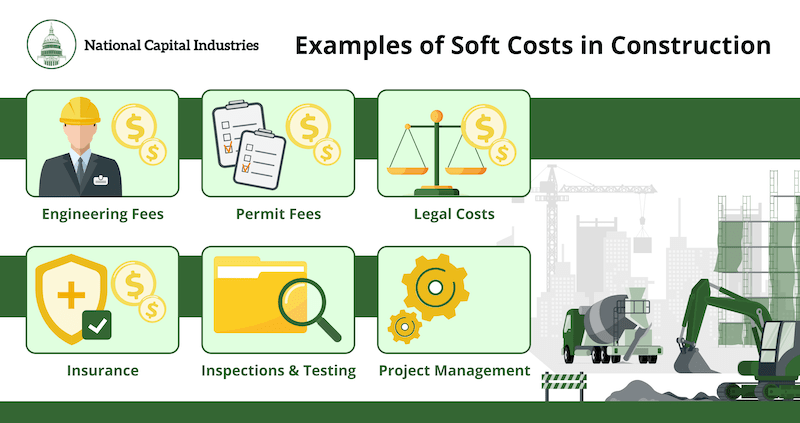
Getting into any construction process, whether as a real estate developer, project manager, or construction company, understanding the concept of costs is paramount. This brings us to a significant concept in the construction industry: soft costs. It’s important to note what soft costs are, differentiate them from hard costs, and provide comprehensive insight into various types of soft costs.
At its simplest, soft costs are expenses unrelated to the direct construction costs, or hard costs. They are not immediately evident when you look at a construction site, but they pack a punch in a project’s budget as they encapsulate several legal, administrative, and design aspects.

Legal fees offer a prime example of soft costs. Initiating an actual construction project usually involves a legal framework. This might encompass contracts with a general contractor, architect, construction workers, and various professionals, not forgetting permits and licenses required. All these carry an expense, making legal fees a clear element of soft costs that must be budgeted for before breaking ground.
Similarly, the engineering fee is another soft cost you’d encounter in a construction project. Surveying the construction site, designing the structure, and ensuring structural safety are tasks assigned to engineers. The fees charged by engineers to get these tasks executed make up another part of these less obvious yet significant costs.
Inspection fees also come under the umbrella of soft costs. The construction process must pass multiple inspections to ensure its adherence to safety norms, building codes, and quality standards. The cost for these inspections, again, forms part of the budget that will not go into the physical construction, but they’re indispensable for a legal, safe, and successful project.
Permit fees are paid to gain lawful permission to commence construction, while the administrative expenses involved in managing all these tasks further inflate the soft costs.
In construction, soft costs and indirect costs are both expenses that are not directly related to the physical construction of a project. Soft costs can sneak up on you. They’re not like labor costs or construction materials that are front and center in the budget breakup.
Other indirect costs such as insurance costs and permit fees can also stake a claim on your construction budget. Having an insurance policy in place helps safeguard against unforeseen circumstances like accidents or damage during construction.

Understanding these intangible costs can significantly impact the overall construction cost. Construction cost is a holistic term that includes both hard costs, the expenses directly associated with the physical construction and soft costs, the indirect expenses associated with a project. These hard and soft costs come together to form the project budget that gives you an estimate of your construction project’s scope, feasibility, and potential for profitability if you’re in real estate.
A significant portion of the construction budget, often overlooked, is consumed by additional soft costs like administrative expenses, professional liability insurance, architectural fees, project manager costs, and banking fees, among others. These costs might not be as evident as hard costs like labor, materials, or equipment, but they are just as integral to the successful completion of a construction project. For instance, professional liability insurance is an indispensable soft cost that protects you from potential legal claims resulting from unexpected issues in the project.
Meeting all the regulations for a construction site can be complicated and often expensive. Complying with these regulations involves tasks such as obtaining a LEED Certification or securing construction permits. These necessitate knowledge, skills, and time, leading to elevated indirect costs. Keep in mind that the sum of these costs could add up to a significant amount of your construction budget.
In summary, the ripple effect of soft construction costs on both your construction budget and the overall construction process is far-reaching. An understanding and anticipation of these costs go a long way in ensuring budgetary control, making the construction process a smooth process.

General contractors and project managers play pivotal roles in cost management. A project manager can streamline the management of soft costs through judicious planning and effective resource allocation. Proactively planning for additional soft costs from the onset, such as legal fees and insurance costs, eliminates surprises and keeps the project on budget and track. Further, by maintaining an open line of communication with all stakeholders, project managers can pull vital threads together to weave a successful project story.
How can National Capital Industries support you in your endeavor to control soft costs? Our extensive range of high-quality construction materials, tools, and equipment available for purchase or rent can significantly reduce your soft costs by ensuring the efficiency and safety of your construction project. By providing materials and equipment that adhere to the highest industry standards, you could potentially reduce the chances of on-site accidents caused by faulty equipment, which can result in costly insurance claims and project delays, inflating your soft costs.
Supplying your crew with Personal Protective Equipment such as safety vests and hardhats and larger gear like traffic safety signs to maintain a safe work environment mitigates unforeseen indirect costs stemming from workplace incidents. Further, with access to our professional contractor supply, you can sidestep the hassles of checking multiple supply houses for your needs, thus saving precious time and resources.
Effectively managing soft costs is more than possible with the right strategies, partners, and tools. With insightful planning, efficient project management, and vetted construction suppliers like National Capital Industries, your next construction project doesn’t have to be a battle against under-the-radar costs.

Developing a keen understanding of soft costs provides you with a competitive advantage within the construction industry. The ability to accurately estimate, plan for, and manage these charges establishes credibility among clients and stakeholders, demonstrating your expertise and commitment to transparency.
Furthermore, it’s crucial to understand soft costs because they directly align with industry trends. For instance, sustainability has become a centerpiece in the construction industry. Embracing eco-friendly measures such as pursuing a LEED Certification can serve as a marked differentiator in a crowded market while delivering soft cost savings.
Soft costs, often seen as the invisible line item on a project’s budget, can make or break a construction project’s success. Knowledge of these costs and their impact is not only essential for effective project management and cost control but also paramount in shaping and evolving within the construction industry.
Having this understanding of soft costs at your disposal and knowing how to strategically manage them can streamline your path to successful construction projects time and time again while lowering unforeseen post-construction expenses.

By providing high-quality tools, materials, and equipment, and invaluable insights accrued over 60 years, we’ve demonstrated our commitment to enhancing work safety, cost-effectiveness, and knowledge growth in the construction industry.
In the end, the success of any construction project lies not just in putting up a structure, but also in navigating the soft costs. At National Capital Industries, our ultimate goal is to help our clients manage these costs effectively through quality products, ensuring each project is not only finished but also a testimony to cost-effective, informed, and strategic execution.
National Capital Industries is ready and enthusiastic to lend our knowledge, experience, tools, and services to navigate the complex, and intricate world of construction. From the first sign to the last line National Capital has you covered!
Contact us today for product assistance in your project.